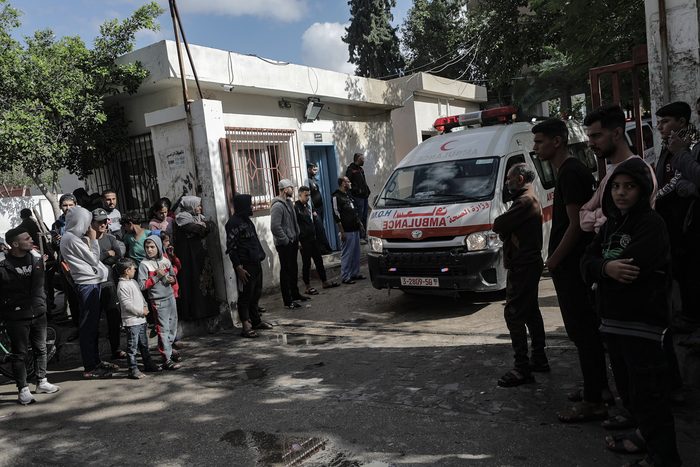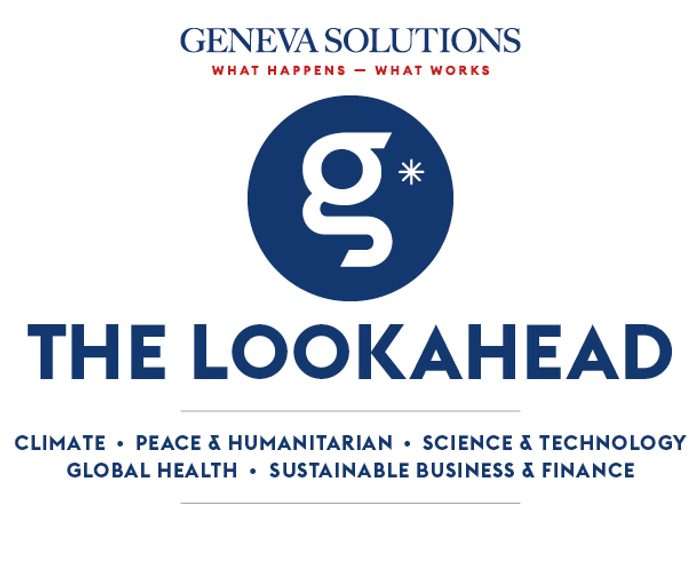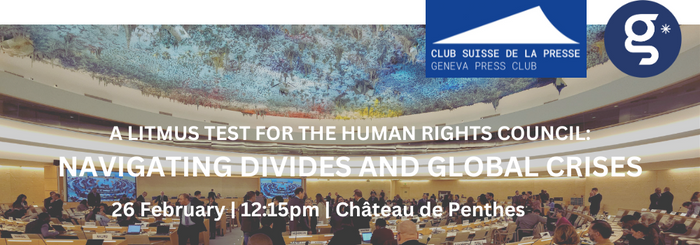Good morning, this is Michelle. We won’t be short of issues to follow this week. While trade ministers will be in Abu Dhabi trying to break decades-old deadlocks, their environmental counterparts will be in Nairobi to tackle the Earth’s biggest challenges.
But for today, we have our eyes on dignitaries huddling in Geneva for the Human Rights Council. One of the major issues to underpin the meeting will be the war in Gaza. Join us to discuss that and more today at lunch just up the hill from all the ruckus. |

Ambulances transport premature babies evacuated from the Al-Shifa Hospital, at the Emirates Crescent Hospital in Rafah, southern Gaza, 20 November 2023. (Keystone/EPA/Haitham Imad)
|
|
|
✨Blue carpet.
The Human Rights Council’s first session of the year is perhaps the most consequential one, with its exclusive high-level segment usually attracting top officials from all places. Among the headliners in town to open the meeting today is UN secretary general António Guterres. The statements of some 137 dignitaries will follow, including around 53 video messages.
|
|
🎦 Unplugged.
After two days and a half of speeches, human rights delegates will get down to business and discuss some of the world’s worst human rights crises, while feeling the effects of one of a different nature – the cash crisis. The UN secretariat has been categorical: meetings will have to stick to official hours, and documentation services will have to prioritise what they can and can’t produce.
While the reason given is unrelated to funding, the UN also decided to no longer provide online participation services, much to the frustration of small state delegations and NGOs that have come to rely on them since Covid.
|
|
⌛ MC13: THE GOOD OLD DAYS.
Around 100 ministers are gathering in Abu Dhabi this week for the World Trade Organization’s (WTO) 13th ministerial conference but don’t expect any “big bangs” in terms of agreements, one Geneva delegate said before leaving last week. That was the 1990s. This is 2023, where, against a global backdrop of rising protectionism, trade tensions and political unease, a step forward rather than backwards is considered a win.
|
|
🏅 The likely “wins”.
Among the deals that are closest to getting across the finish line this week is a second deal to clamp down on harmful fishing subsidies – specifically those that contribute to overcapacity and overfishing – after a first agreement was signed in Geneva in 2022. Ministers are also confident that a moratorium on applying duties to electronic transmissions will be extended, despite countries including India and Indonesia opposing it. And a deal to remove red tape hampering foreign direct investment was finalised yesterday on the eve of the conference in Abu Dhabi by 123 of the WTO’s members six years since talks started, with the aim this week of getting remaining countries to agree to integrate it within the WTO.
|
|
🌳 The worry tree.
High up on the list of concerns are US elections, dimming prospects of making any real progress on fixing the WTO dispute settlement system before November. Indian brinkmanship: from fisheries to e-commerce: you name it, India is blocking it, causing frustration among delegates going into MC13, and the prospect of many late nights. Agriculture: among the most contentious issues dampening hopes of making any headway is a push by India and some other developing countries’ for a permanent waiver on rules that restrict domestic agriculture subsidies.
|
|
|
A litmus test for the Human Rights Council: navigating divides and global crises.
The Human Rights Council is gearing up for its first session of the year on 26 February amid a tumultuous global landscape. From war in Ukraine to conflicts in Sudan, Syria, Myanmar and Gaza, a spectrum of human rights crises awaits the 47-member UN body. As geopolitical fractures deepen and accusations of double standards tarnish the West’s credibility, can the council stay relevant? How will the UN’s funding crisis impact its effectiveness? How will the freshly elected council president, Morocco’s ambassador Omar Zniber, chart the course through a jam-packed six-week session?
Join our journalists and human rights experts today at 12:15 pm at Château de Penthes on the opening day as they debrief on their expectations in our monthly talk at the Geneva Press Club.
Sign up here to attend in person or online.
|
|
|
GS news is a new media project covering the world of international cooperation and development. Don’t hesitate to forward our newsletter!
Have a good day!
|

|
|
Avenue du Bouchet 2
1209 Genève
Suisse
|
|
|
|









